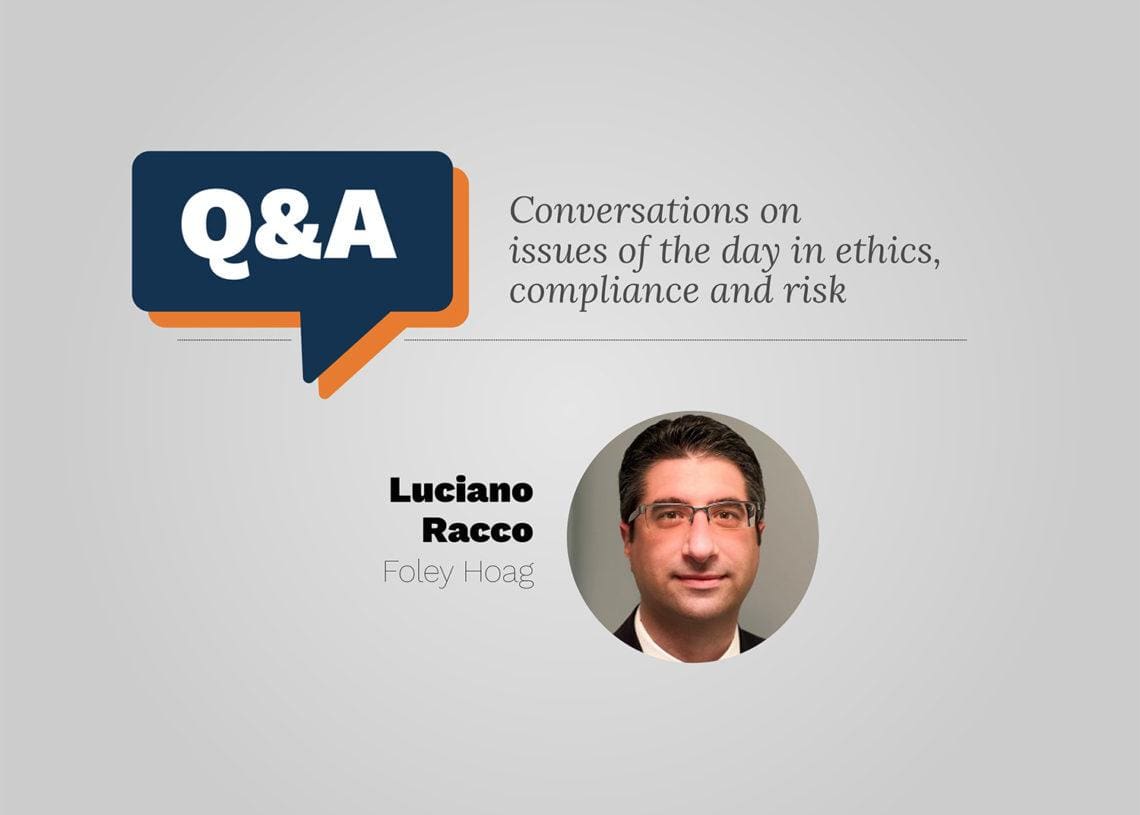Sanctions against Russian oligarchs and key businesses are unprecedented across at least two key dimensions: (1) The scale: Russia is a major economic power, so its financial tentacles are widespread; and (2) The speed: prior sanctions against countries like Iran or Cuba were enacted over months and years; Russian sanctions took hold in a matter of weeks. To help companies better understand their sanctions-driven exposures and potential responses, Corporate Compliance Insights spoke with Luciano Racco, counsel and co-chair of the Trade Sanctions & Export Controls Practice of Foley Hoag, LLP.
Bill Millar, managing editor, Corporate Compliance Insights (CCI): Who are the regulators empowered to enact sanctions?
Luciano Racco (LR): The primary body is the U.S. Treasury Department’s Office of Foreign Assets Control (OFAC), but other agencies may also impose sanctions, like the Department of State. In addition, the Department of Commerce has authority to name specific companies that may no longer receive exports of certain U.S.-origin goods or technology, or certain items exported from the U.S. regardless of origin. This is often referred to as a sanction, but I view it more as an export control.
The sanctions program imposed against Russia is without a doubt the most complex ever implemented. … The pace is unprecedented. Prior sanctions regimes were rolled out over an extended period. Here, companies are trying to comply with sanctions within a six-week period.
CCI: Put this into historical perspective. Could you give us an order of magnitude? How do the sanctions being imposed on Russia as a result of its invasion of the Ukraine compare to other sanctions environments?
LR: The sanctions program imposed against Russia is without a doubt the most complex ever implemented. It’s complex, not only by the volume and scope of sanctions, but also from the coordination between the U.S., U.K., E.U. and many other nations. You cannot simply focus on where you are based; you must look across multiple jurisdictions. So, for companies operating globally, it can be remarkably challenging trying to keep up with everything that is going on.
Another aspect of this is the sheer scale. We’ve seen comprehensive sanctions programs enacted against relatively small economies such as Cuba, North Korea and Iran. But this is Russia, by comparison one of the world’s most significant economies — No. 11 in GDP, according to the World Bank. As such, there are many U.S. companies with significant business dealings in Russia.
Finally, the pace is unprecedented. Prior sanctions regimes were rolled out over an extended period. Here, companies are trying to comply with sanctions within a six-week period.
CCI: What sorts of companies are being sanctioned?
LR: To date, I would say the most significant sanctions are targeting Russian financial companies and banks, as well as Russian defense companies. Russian aerospace is also being sanctioned, as is the technology sector.
CCI: What happens when it turns out your company is working with a sanctioned entity?
LR: One issue will be government enforcement. You could be charged with violating the sanctions, which could include both financial and criminal penalties. Similarly, you yourself or your company could be seen as willfully violating sanctions and in turn become sanctioned.
CCI: What is this “50 percent rule” that keeps coming up regarding sanctions?
LR: Any entity that is owned 50 percent or more in the aggregate by parties subject to blocking sanctions is itself considered sanctioned. There are various degrees of problems you will run into, but in the worst case, your company becomes sanctioned itself.
But even if only a minority of your shareholders are being sanctioned, that can still cause problems. For example, say you have an investor, owning just 10 percent of your company, who becomes sanctioned. Say you’d like to sell your company. It will now be very difficult to find a buyer who would want to get involved with a company that has a sanctioned shareholder. Moreover, you would need to get approval from the government to sell the sanctioned shareholder’s shares, which in today’s climate would be very difficult to obtain.
Even if you’re not looking to sell the company, the presence of a sanctioned minority investor can cause problems. For example, there may be circumstances where their ownership gives them rights where they need to be consulted and give approval on certain decisions of the company. But to enter such consultation, a company would need to apply for and obtain a license from OFAC to engage with their sanctioned minority party.
CCI: So once your company has majority or even minority ownership involving sanctioned parties, what are the next steps?
LR: Well, at that point it’s too late to be proactive, so now you’ve got to react. And you’ll need to really assess, you know, how does this impact the company’s operations? Do we need to apply for a license? Do we have to move right now, should we start a dialog with the government, or would it be better to wait and see?
We have clients in all the buckets I just described, including ones that are literally watching the sanctions list on a day-to-day basis to see if they will reach the 50 percent threshold. That is, if a certain oligarch gets sanctioned today, “we’re done.” It’s not a comfortable place to be.
CCI: So, it’s an ever-expanding list of sanctioned parties; how can companies stay on top?
LR: Regulatory agencies generally put out a press release and certainly an email announcement. So, if you’re concerned, you should subscribe to their announcements. There are also subscription services that allow you to screen across all known sanctions.
That’s one of the things we do — stay on top of things. But it’s also important to check the news. The sanctions that came out (April 6) were foreshadowed by Bloomberg and other sources like the Wall Street Journal. So, there are leaks that happen now and then in advance as to what actions are going to take place.
In worst cases, you may need to engage with authorities. In those cases, it is often best to voluntarily disclose the issue to the appropriate regulator. Doing so can mitigate the severity of the situation and (your attorney) will help you decide how best to proceed.
CCI: We’re paying attention, we see our company is now in the thick of things, so we’re calling our attorney. When we call you, what happens next?
LR: The first thing we’re going to do is assess which sanctions are applicable to you, the individual, or your company. Not all sanctions are created equal: Some are a complete block on doing any business with the individual or the company, whereas others might just be a restriction on certain activities.
This may amount to needing to place some restrictions in the way you do business with a sanctioned entity. For example, it may be that you can no longer provide debt financing with a term that’s more than 14 days. Longer than that, you could be seen as providing credit to a sanctioned entity. So you might just need to adjust your credit terms from 30 days down to 14.
Other sanctions restrict transactions related to specific types of energy dealings, like drilling in the Arctic or similar. So it’s very important to understand what the specific sanction prohibits. After a review, we would make specific recommendations: What do you need to do to comply with these specific sanctions? In worst cases, you may need to engage with authorities. In those cases, it is often best to voluntarily disclose the issue to the appropriate regulator. Doing so can mitigate the severity of the situation and we will help you decide how best to proceed.
CCI: How easy is it to accidentally violate these sanctions?
LR: It’s very easy, especially if you don’t have an internal compliance program or someone who can advise you as to whether an entity is sanctioned. There are literally thousands of companies and individuals around the world who are on a sanctions list.
Many companies, in fact, do not conduct any screening at all. Depending where in the world you’re operating, this could be more than just business partners; it can be customers, vendors, members of your supply chain or even employees.
In terms of investors, part of the risk is that an investor could, in turn, be owned by a sanctioned person. So unless you’re digging into beneficial ownership information, you will not discover this risk potential until too late.
CCI: What impacts are you seeing among your clients?
LR: Many are scrambling to unwind relationships, which can be a huge problem, for example, if you’re sourcing from a sanctioned company. Normally it takes 18 months to evaluate and bring on a new vendor. So, companies are in many cases having a very difficult time. Overall, it’s been a very condensed period for companies to try and find alternate sources.
CCI: People are saying this Russia-Ukraine conflict could become another Afghanistan. How long will this persist?
LR: That is anyone’s guess. But what will be interesting to see is how long the U.S. and its allies remain in lockstep on this. For example, what if there’s a cease-fire? Maybe some will say it’s time to reduce the sanctions. What is the condition that will call for all sanctions being withdrawn? Partial withdrawal? Full withdrawal to pre-invasion conditions? Return Crimea? Some may hold out for full regime change. How long the coalition remains aligned is uncertain.
CCI: What does this mean for your firm and its clients?
LR: Let’s just say I’ve been trying to keep up with new sanctions and new clients today and almost every day. It’s been incredibly complex, and not only for companies that don’t typically deal with sanctions but, frankly, also for sanctions lawyers who must work constantly to understand and keep up with this onslaught of new sanctions.
This interview has been lightly edited for length and clarity.
Luciano Racco is co-chair of Foley Hoag’s Trade Sanctions & Export Controls practice. He advises clients on a wide range of international trade regulations, including sanctions and export controls under the Export Administration Regulations (EAR), Foreign Trade Regulations (FTR), International Traffic in Arms Regulations (ITAR) and Office of Foreign Assets Control (OFAC) regulations. He also routinely advises clients on the Committee on Foreign Investment in the United States (CFIUS) regulations, anti-boycott laws, Withhold Release Orders (WROs) and anti-corruption laws including the Foreign Corrupt Practices Act (FCPA). Racco attended the Vanderbilt University Law School (J.D., 2008) and the College of the Holy Cross (B.A., Economics and History, Phi Beta Kappa, 2004). He speaks English and Italian.



 Bill Millar is a longtime business writer, researcher, roundtable facilitator and speaker. He began his career as a Wall Street practitioner, working in treasury and trading at Euro Brokers, Drexel Burnham Lambert and E.F. Hutton before taking on a 12-year stint at The Economist Group. For the past 30-plus years, Bill has been writing about all manner of compliance and risk management, including deep dives into finance, treasury operations, core and emerging technologies, ethics and taxation. He has written more than 20 books including, “Financial Innovations,” “101 Treasury Checklists” and “The One to One B2B.”
Bill Millar is a longtime business writer, researcher, roundtable facilitator and speaker. He began his career as a Wall Street practitioner, working in treasury and trading at Euro Brokers, Drexel Burnham Lambert and E.F. Hutton before taking on a 12-year stint at The Economist Group. For the past 30-plus years, Bill has been writing about all manner of compliance and risk management, including deep dives into finance, treasury operations, core and emerging technologies, ethics and taxation. He has written more than 20 books including, “Financial Innovations,” “101 Treasury Checklists” and “The One to One B2B.”






